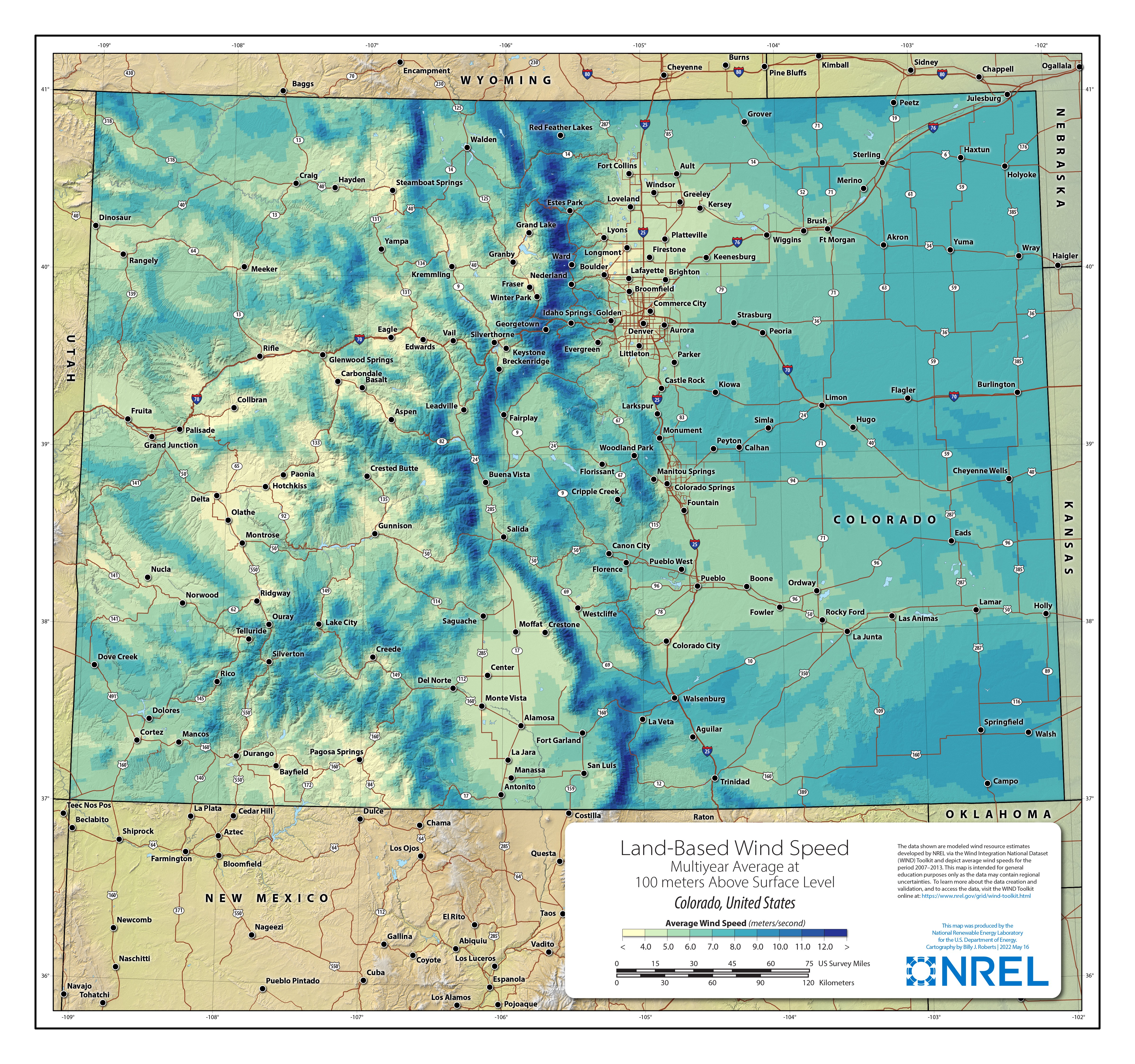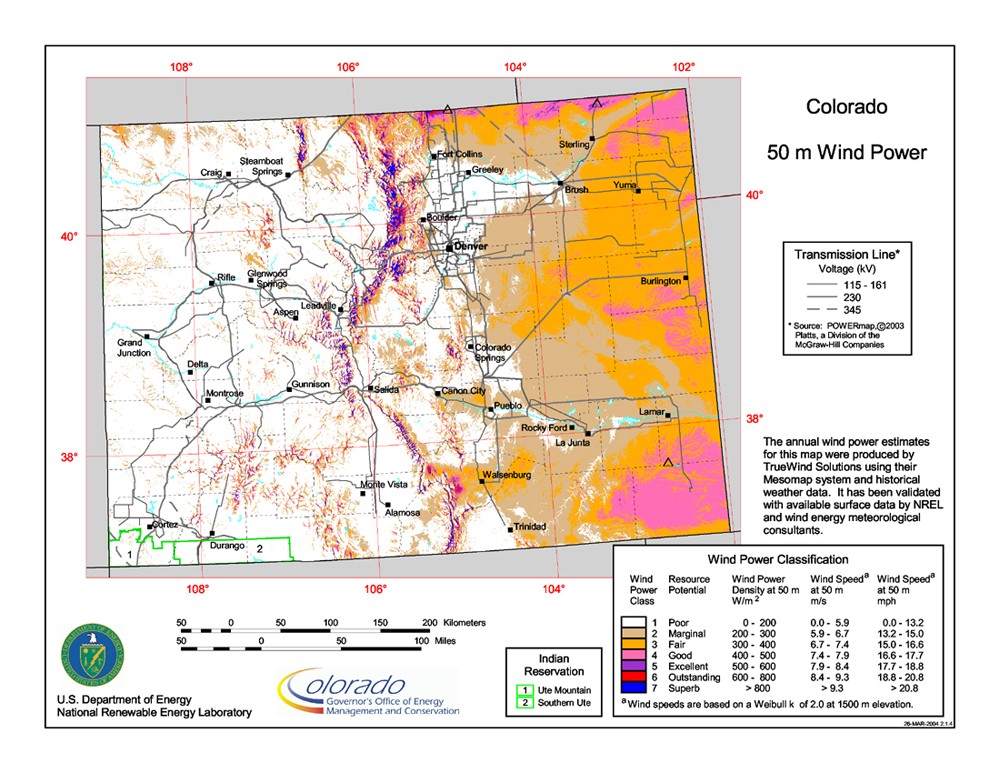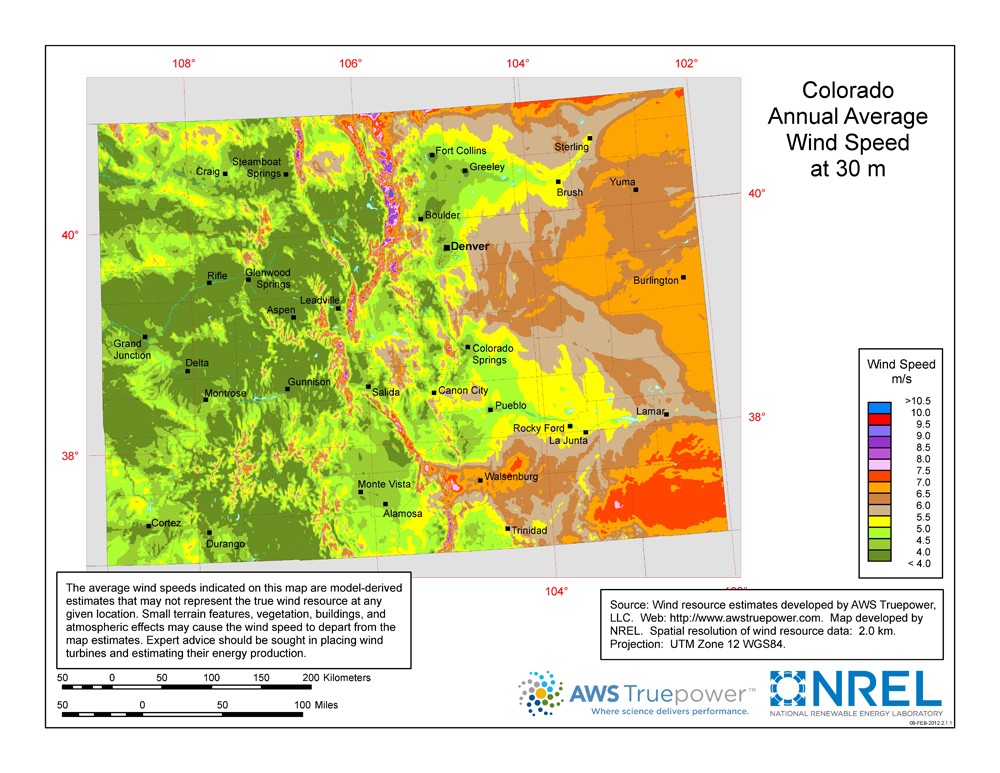Wind Energy in Colorado
Find wind data and information in Colorado, including maps, capacity, ordinances, and more in these areas:
Capacity & Generation
Installed Capacity 4,844 MW Source: American Clean Power Association
MW Under Construction 0 MW Source: American Clean Power Association
Based on EIA data from 2024
U.S. Wind Turbine Database
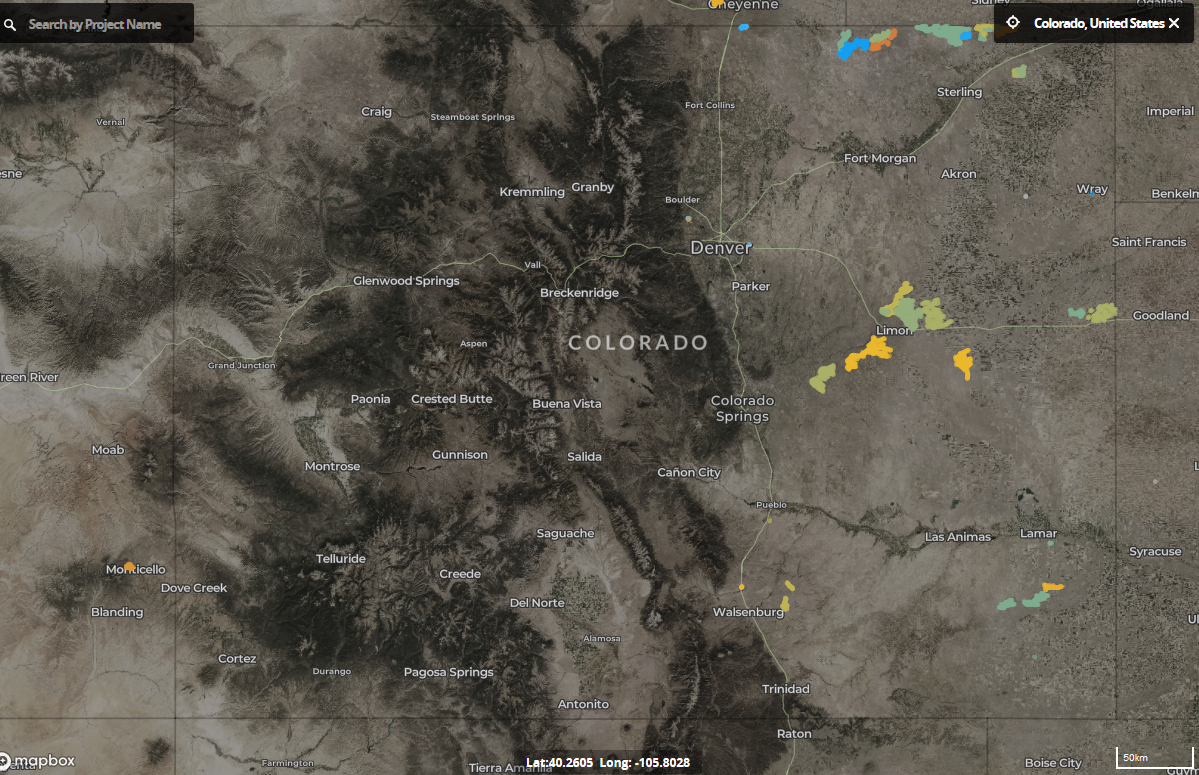
The United States Wind Turbine Database (USWTDB) provides the locations of land-based and offshore wind turbines in the United States, corresponding wind project information, and turbine technical specifications. The creation of this database was jointly funded by the U.S. Department of Energy Wind Energy Technologies Office via the Lawrence Berkeley National Laboratory Electricity Markets and Policy Group, the U.S. Geological Survey Energy Resources Program, and the American Wind Energy Association.
Wind Education & Training
Career training and projects at schools in Colorado.
Training Locations
University of Colorado - Boulder
Colorado School of Mines
Colorado State University
Lamar Communty College
Northeastern Junior College
University of Denver - Sturm College of Law
Wind for Schools Project Locations
There are no Wind for Schools projects in Colorado.
Policies & Incentives
16 local wind energy ordinances
Colorado Incentives
View current Colorado renewable energy incentives on the DSIRE website.
Renewable Portfolio Standard
CO Cities with 100% Renewable Energy Commitments
- Aspen - Powered by 100% renewable electricity as of 2015
- Boulder - 2030
- Breckenridge - Municipal operations by 2025, community by 2035
- Denver - 2030
- Fort Collins - 2030
- Lafayette - 2030
- Longmont - 2030
- Nederland - 2025
- Pueblo - 2035
WETO R&D Projects
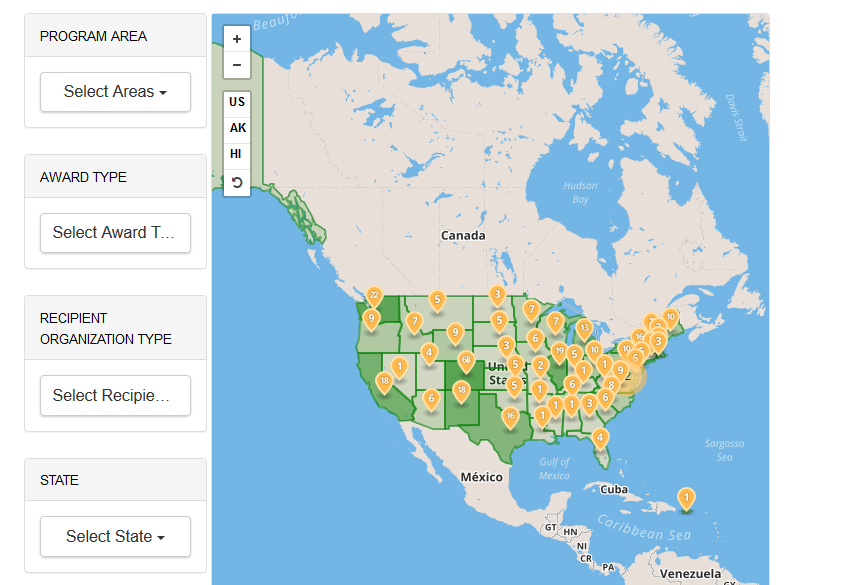
To view a list of wind research and development projects in Colorado funded by the U.S. Department of Energy’s Wind Energy Technologies Office, visit the Wind R&D Projects Map and select Colorado from the dropdown menu.
Wind Turbine Component Manufacturers
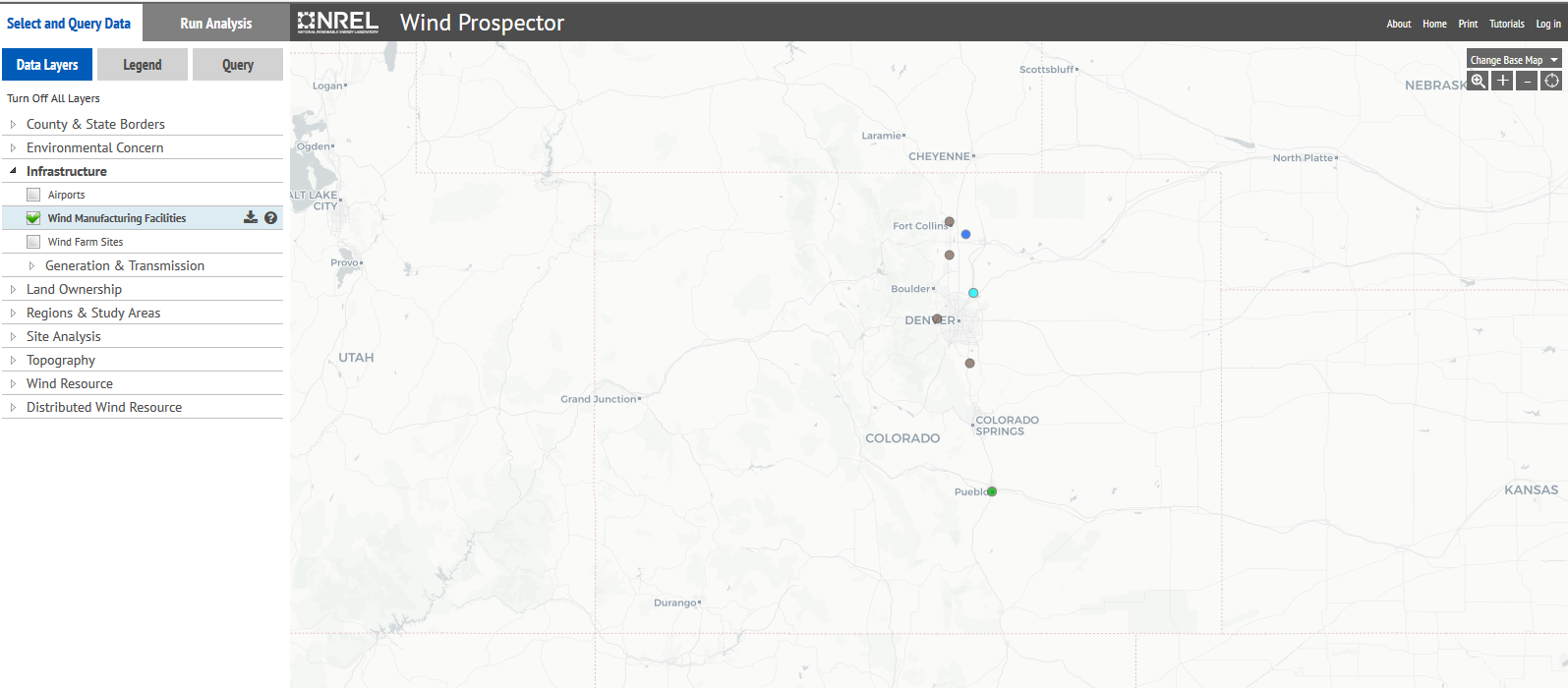
The National Renewable Energy Laboratory’s Wind Prospector tool is a web-based Geographical Information System that supports resource assessment and data exploration for wind development. Wind Prospector includes a data layer dedicated to the locations of U.S. wind turbine and component manufacturing and supply chain facilities. Corporate headquarters, service facilities, material suppliers, R&D and logistics centers, and smaller component manufacturers (e.g., bolt manufacturers) are not included. The list of facilities included is not intended to be exhaustive.
Colorado Offices & Organizations
Colorado Energy Office
The Colorado Energy Office offers information about renewable energy in the state and links to other resources.
High Plains Regional Climate Center
As part of the School of Natural Resources at the University of Nebraska-Lincoln, the High Plains Regional Climate Center provides the public with several ways to access climate data and information and engages stakeholders to learn about and help address their climate-related concerns. The High Plains Regional Climate Center turns climate data from thousands of stations across the country into usable information on the local, regional, and national levels for use in agricultural
decision-making, drought monitoring, water resource management, and more. The center's six-state region covers Kansas, Colorado, Nebraska, Wyoming, South Dakota, and North Dakota.
Interwest Energy Alliance
Interwest is a regional trade association representing developers and manufacturers of large-scale renewable energy, working for the responsible expansion of renewable energy in Arizona, Colorado, Nevada, New Mexico, Utah, and Wyoming.
National Renewable Energy Laboratory
Just south of Boulder, Colorado, the National Wind Technology Center at the Flatirons Campus is nestled at the base of the Rocky Mountain foothills. The 305-acre site experiences diverse and vigorous wind patterns—more than 100 miles per hour—making it an ideal setting for evaluating the reliability and performance of wind turbines. The Laboratory offers the following wind research facilities to meet industry needs: the Composites Manufacturing Education and Technology Facility, the High-Performance Computing Center, the Controllable Grid Interface, dynamometers, structural research facilities, and Field Research Validation Sites.
